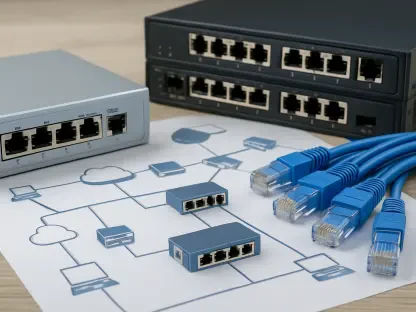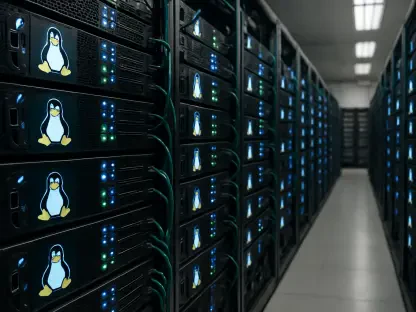In an era where centralized cloud computing dominates the tech landscape, a bold contender has emerged to challenge the status quo with a revolutionary approach to harnessing computational power. Acurast, a decentralized compute network, has rolled out an innovative protocol update known as Staked Compute, aiming to disrupt the stronghold of giants like AWS, Azure, and Google Cloud. This groundbreaking initiative taps into the vast, untapped potential of smartphones worldwide, transforming everyday devices into a powerful, secure, and cost-effective alternative to traditional data centers. By leveraging the sheer ubiquity of mobile hardware, Acurast is not just offering a new tool but redefining how enterprises and developers access critical resources. This development signals a potential paradigm shift, raising questions about the future of cloud services and the role of decentralization in addressing long-standing challenges like cost, security, and reliability in computing infrastructure.
Revolutionizing Compute with Decentralized Smartphone Power
Harnessing Global Mobile Resources for Unmatched Reach
Acurast’s vision rests on a simple yet transformative premise: billions of smartphones across the globe represent a massive, underutilized reservoir of computational capacity. These devices, equipped with advanced hardware and Trusted Execution Environments (TEEs), form the backbone of a decentralized network that spans diverse geographies and manufacturers. This global distribution creates a resilient infrastructure, as the network does not depend on a single type of high-end device but instead embraces hardware heterogeneity. From budget models to premium handsets, Acurast ensures that tasks are allocated based on specific workload needs, whether it’s sustained power for AI inference or periodic availability for data-fetching. The result is a system that adapts dynamically, matching enterprise demands with the right resources while maintaining efficiency. This approach not only maximizes reach but also mitigates risks associated with centralized points of failure, positioning the network as a robust alternative to conventional cloud solutions.
Building Reliability through Hardware Verification and Benchmarking
One of the standout features of Acurast’s Staked Compute protocol is its focus on reliability, a persistent challenge in decentralized systems. By integrating hardware-verified execution on both iOS and Android platforms, the network ensures that computations are performed securely within sealed environments. A global benchmarking protocol further enhances this reliability by assessing device capabilities and matching them to appropriate tasks, ensuring consistent performance across varied hardware. This meticulous process addresses past issues in Decentralized Physical Infrastructure Networks (DePIN), where inconsistent availability often undermined trust. With Acurast, providers are held accountable through stake-backed commitments, aligning their incentives with network uptime. This mechanism creates a service-level mindset, where economic rewards are tied directly to performance, fostering a dependable ecosystem that enterprises can rely on for critical workloads without the oversight of centralized operators.
Redefining Enterprise Solutions with Security and Cost Efficiency
Prioritizing Data Confidentiality with Trusted Environments
Security stands as a cornerstone of Acurast’s value proposition, particularly for enterprises handling sensitive data. By executing workloads within Trusted Execution Environments on consumer smartphones, the network guarantees a high level of confidentiality, shielding information from unauthorized access even on shared devices. This sealed approach offers a stark contrast to traditional cloud setups, where data often traverses centralized servers with potential vulnerabilities. Acurast’s design ensures that sensitive computations remain isolated, providing peace of mind for businesses in industries like finance or healthcare, where privacy is non-negotiable. This focus on secure execution not only meets stringent regulatory demands but also builds trust in decentralized compute as a viable option. As companies increasingly prioritize data protection amidst rising cyber threats, Acurast’s commitment to confidentiality emerges as a compelling differentiator in the competitive cloud market.
Delivering Affordable Compute without Compromising Quality
Beyond security, cost efficiency is a critical advantage that Acurast brings to the table for enterprise users. Utilizing phone-class hardware significantly reduces expenses compared to the server-class infrastructure of traditional cloud providers, enabling competitive pricing without sacrificing performance or reliability. This affordability is particularly beneficial for startups and small-to-medium enterprises seeking scalable solutions without the hefty price tags associated with established giants. Moreover, Acurast’s staking model, which directs a substantial portion of network inflation to the Staked Compute Pool, incentivizes providers to maintain high uptime, ensuring quality of service. Unlike mobile mining concepts that waste resources on synthetic tasks, Acurast channels computational power into productive applications like AI processing and automation. This dual emphasis on low cost and practical utility positions the network as an attractive choice for businesses looking to optimize budgets while meeting diverse workload demands.
Reflecting on a Milestone in Decentralized Innovation
Looking back, Acurast’s introduction of the Staked Compute protocol marked a pivotal moment in the journey toward decentralized infrastructure. The seamless integration of hardware verification, global benchmarking, and economic incentives tackled longstanding reliability concerns, setting a new benchmark for community-driven compute networks. Testnet achievements, including onboarding over 119,000 phones and processing millions of on-chain transactions, underscored the scalability and impact of this initiative. For enterprises, the blend of top-tier security via Trusted Execution Environments and cost-effective pricing reshaped expectations of what cloud alternatives could achieve. As a next step, stakeholders are encouraged to explore how such decentralized models can be tailored to specific industry needs, from AI-driven applications to secure data handling. Further collaboration between developers and device owners through platforms like the Acurast Hub could amplify adoption, paving the way for a future where computational power is truly democratized and accessible to all.









